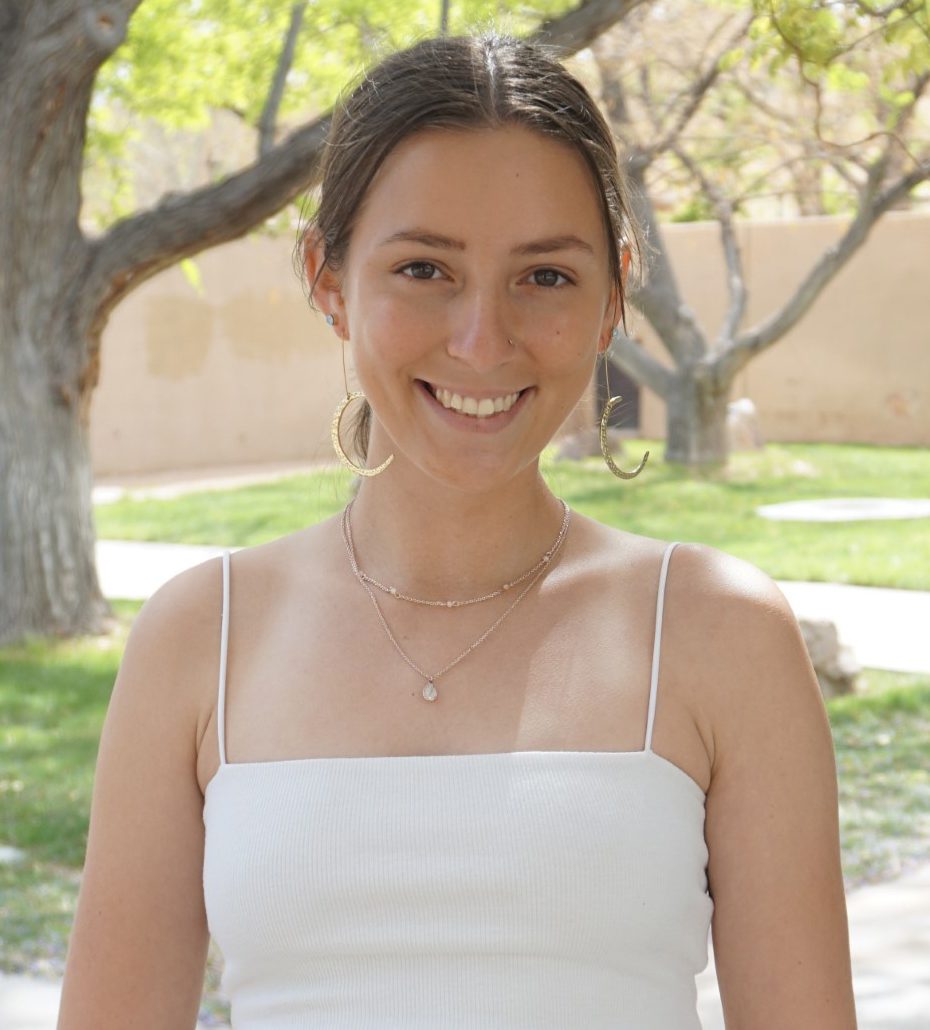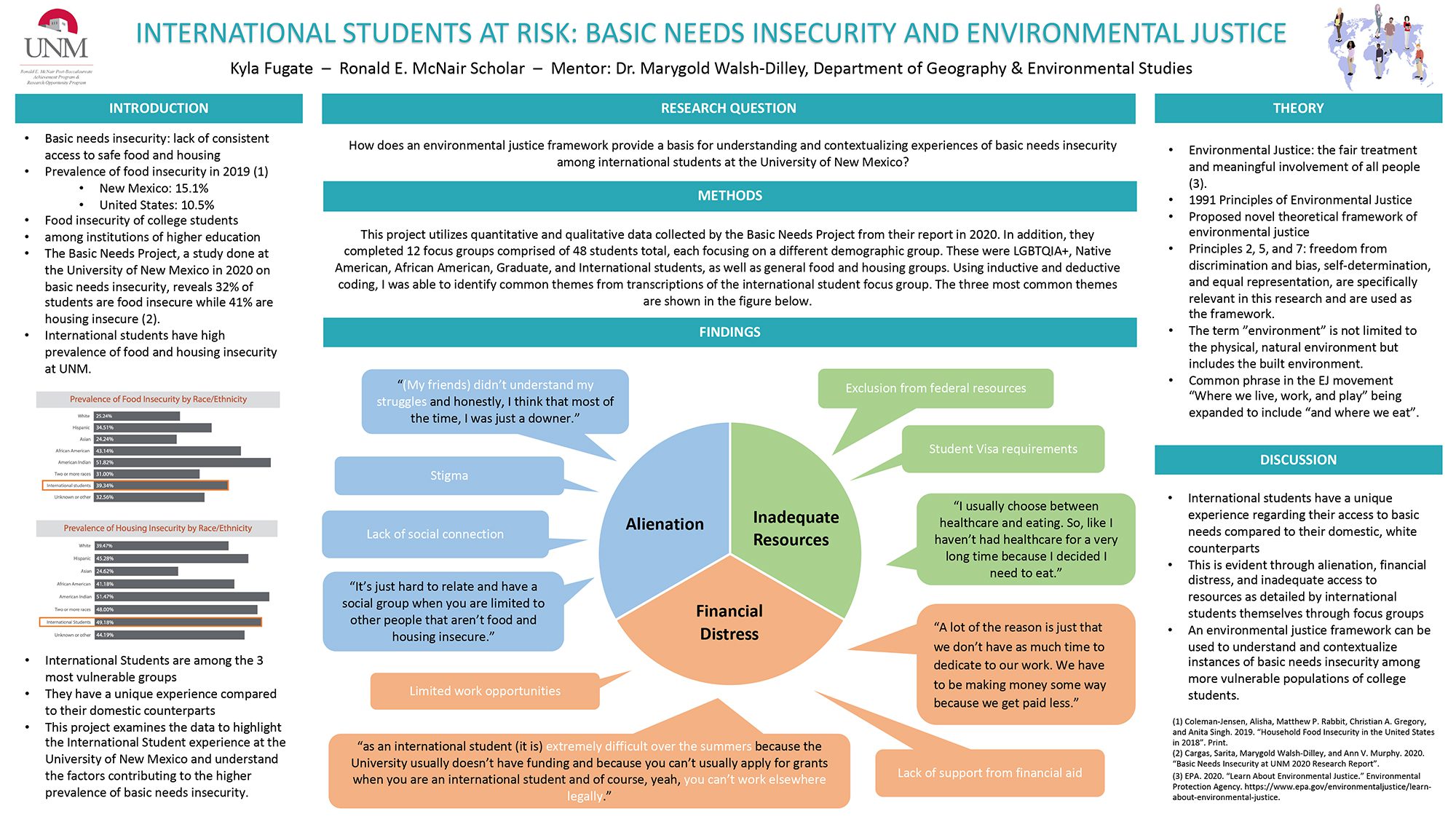By Kyla Fugate
Research Story Competition, Honorable Mention.
Undergraduate Research Opportunities Conference, 2022.

Roughly two years ago, I was accepted into the Ronald E. McNair Research program at the University of New Mexico. The program prepares high achieving undergraduate students for admission into graduate school to pursue master’s and doctoral degrees and gives them the opportunity to conduct faculty-mentored research. When I applied, I was finishing up my sophomore year and had never done research before, or even really considered graduate school. Starting Fall 2020 as a McNair scholar, I was taking an honors class called Food and Society with Dr. Marygold Walsh-Dilley. I’ve always had an interest in food systems and took the class as an elective. The topic of food insecurity became prominent in the class and quickly became an interest of mine.
I grew up lower middle class, but my parents always made sure my sister and I were provided for. My mom is a schoolteacher, so when my parents divorced, I could see her struggle as a single income parent. We had food stamps for some time and although we never went hungry, I remember it was an extremely difficult time. Knowing this, and seeing close friends of mine have similar experiences, food insecurity was personal to me. During the class, we completed a “Supplemental Nutrition Assistance Program (SNAP) Challenge” project that challenged us to eat within the budget of the average SNAP benefits given to a one-person household, which is $4.61 per day. It was extremely difficult but allowed me to recognize my privilege with my access to food. I have been lucky to receive SNAP benefits while in college, but without them I would have struggled to meet my needs.
During the Fall 2020 semester, I was in the planning process of my capstone project for the Sustainability Studies minor, and I wanted to frame my project around food insecurity, but I wasn’t sure how. At the same time, I was searching for a mentor for my McNair research while trying to figure out what I even wanted to conduct research on. I felt completely overwhelmed trying to plan both projects, and I even thought about quitting the McNair program. The program director, Ricardo Romero, and advisor, Jennifer Payne, were supportive but encouraged me to stay in the program. So, I did. I reached out to Marygold and told her about my research interests. She told me about the Basic Needs Project, a research study on the prevalence of food and housing insecurity at the University of New Mexico. There was an internship position available through the Honors Research Institute as an undergraduate research assistant, so I decided to pursue it. Marygold agreed to be my mentor for both projects, using my capstone project as a precursor to my McNair research. I started with the team that Fall.
In the initial survey in 2020, the Basic Needs Project revealed that 32% of UNM students experienced food insecurity and nearly 41% experienced housing insecurity. What was even more alarming was that certain demographic groups experienced an even higher prevalence of insecurity. The three most vulnerable groups were Native American students, LGBTQ+ students, and international students. I had never considered the challenges that international students face attending college outside of their home country and the potential struggle to meet their basic needs of food and housing. In 2020, 40% of international students experienced food insecurity and nearly 1 in 2 international students experienced housing insecurity. Soon after my initial research, it became apparent that international students were an understudied group within the literature.
“Engaging in this research has been extremely insightful and humbling… The prevalence of food insecurity among college students being three times the national average is alarming.”
I decided to focus on this group for my research to understand how and why international students were a particularly vulnerable group. I used transcriptions of focus groups and interviews with international students to parse out themes of experience regarding their access to food and housing while attending UNM. I framed my research using an environmental justice framework that I created which utilizes three principles of environmental justice to further understand basic needs insecurity. Findings from my initial study can be seen in the research poster below.

I presented this research for the first time at UROC in 2021, and I was absolutely terrified. It was on Zoom, which made it more manageable, but I remember being anxious and dreading my presentation. Up until the minute, I was thinking of ways I could get out of it to avoid public speaking. My mentor Marygold really guided me through the process of presenting my research and gave me as much constructive criticism as it took. I presented this research three more times, both among my peers and complete strangers, and have slowly become more confident in presenting my research to people.
Following the completion of the McNair summer research, I continued my research into Fall 2021 and enrolled in an independent study course with Marygold with the intention of publishing a manuscript in a journal. Still working under the Basic Needs Project, I was able to conduct my own interviews with international students and be a part of some focus groups.
Being able to interact with students directly was a valuable experience that gave me a deeper understanding of international students’ experiences while attending UNM. These findings are still being synthesized and have not yet been completed, but I will be presenting them at the Western Regional Honors Conference hosted by UNM this April.
Engaging in this research has been extremely insightful and humbling. The implications for this study can be seen in many ways but most importantly is for the University to ensure students’ basic needs are being met. The prevalence of food insecurity among college students being three times the national average is alarming. The Basic Needs Project will hopefully continue to conduct research in the future through surveys and focus groups to gain a full perspective of the issues on campus and implement solutions that will lower the prevalence of basic needs insecurity among students.
I hope my research story reaches students who are interested in research but don’t know where to start. My advice to those students is to go for it. Find something that you are interested in learning about and someone who will support you and give it your best effort. One thing I struggled with a lot was imposter syndrome, feeling like I didn’t belong in research or academia, but it was always so far from the truth. You earned your spot wherever you are, and you have something to contribute to the world, even if it feels small.
